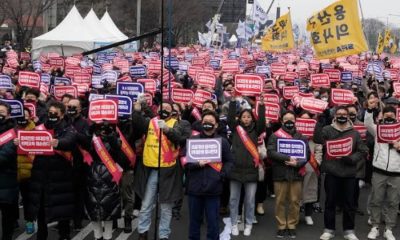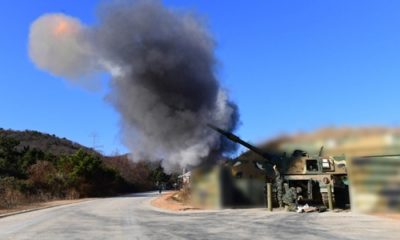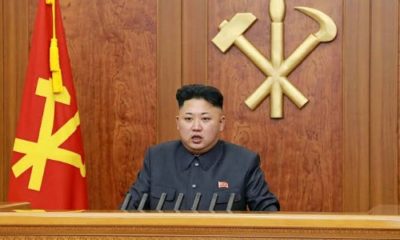International News
North Korea Shuts Border With S’Korea, Declares Neighbour ‘Principal Enemy’
In a significant military move, North Korea announced on Wednesday its decision to “permanently shut off and block the southern border” with South Korea.
The action, which has been communicated to the United States military to avoid accidental clashes, marks a further escalation in inter-Korean tensions.
In a statement, Pyongyang outlined plans to cut off roads and railways that could have facilitated future travel between the two nations.
Read Also: Japan’s New PM, Ishiba, Dissolves Parliament Ahead Of Election
The border between North and South Korea, already one of the most heavily militarized in the world, will now be further fortified with defense structures.
Though North Korea labeled the decision a “major military step,” analysts suggest it continues a long-standing process.
Over recent months, Pyongyang has increasingly isolated itself, closing agencies dedicated to reunification and declaring South Korea its “principal enemy.”
The announcement coincides with the appointment of No Chol as North Korea’s new defense chief, replacing Kang Nam.
Notably absent from state media reports, however, was any mention of North Korea formally nullifying a 1991 inter-Korean agreement, an action anticipated by experts during a parliamentary meeting that concluded on Tuesday.
The agreement, signed during a period of relative détente, aimed to reduce military tensions between the two countries.
The North Korean army revealed that it had informed U.S. forces early Wednesday to avoid misunderstandings as it moves forward with the fortification project along the southern border.
Despite the tight security measures at the border, breaches have still occurred, with a North Korean crossing into the South in August, and ongoing construction of barriers and landmines reported by South Korea.
In July, Seoul reported that Pyongyang had spent months laying landmines and erecting barriers, turning areas of the fortified border into an uninhabitable wasteland.
June saw further casualties among North Korean soldiers working on border reinforcement, with multiple deaths resulting from landmine explosions.
Meanwhile, observers in Seoul noted the gradual demolition of parts of the Donghae Line railway, which once connected the two Koreas.
Analysts like Yang Moo-jin, president of the University of North Korean Studies, interpreted the destruction as a deliberate severance of ties.
Wednesday’s announcement, Yang said, was “official confirmation” of the regime’s broader strategy.
North Korea’s military justified the move as a “self-defensive measure” in response to ongoing South Korean war exercises and visits by U.S. strategic nuclear assets.
Despite escalating rhetoric, no formal changes were made regarding the North’s stance on South Korea during this week’s parliamentary meeting.
Hong Min, a senior analyst at the Korea Institute for National Unification, suggested that North Korea may be holding off on further decisions regarding Seoul until after the upcoming U.S. presidential election.
Adding to the complex geopolitical landscape, Seoul’s defense chief hinted earlier this week that North Korean soldiers may be fighting alongside Russian forces in Ukraine.
Some troops are believed to have been killed, with more expected to be deployed.
International News
Samsung Electronics Co-CEO, Han Jong-hee Dies At 63

Han Jong-hee, co-CEO of Samsung Electronics and a driving force behind the company’s dominance in the global television market, has died of a heart attack at the age of 63, the company confirmed on Tuesday.
“He died from cardiac arrest today,” a Samsung spokesperson stated, adding that Han is survived by his wife and three children.
Having joined the company in 1988, Han played a significant role in shaping Samsung’s television business.
READ MORE: Samsung Reports Worst Quarterly Profits In 14 Years
His leadership was instrumental in the launch and success of the company’s high-end LED TVs, which helped establish Samsung as a global leader in the industry.
“Han was central in the unveiling of Samsung’s world-class LED TVs,” the company noted in a biography published earlier this month. “His numerous other innovations enabled the company to continually demonstrate its technology leadership.”
His efforts ensured that Samsung maintained its position as a dominant force in the global television market.
Han’s death comes at a time when Samsung Electronics is grappling with challenges in the AI chip sector.
The company has been facing difficulties in meeting Nvidia’s standards, while its South Korean competitor, SK Hynix, has emerged as the leading supplier of high-bandwidth memory (HBM) chips for Nvidia’s AI processors.
Chairman Lee Jae-yong recently underscored the urgency of the situation, urging Samsung to adopt a “do-or-die” approach to overcome the growing challenges in the AI industry.
Last October, the company acknowledged it was facing a “crisis,” citing concerns over its “fundamental technological competitiveness and the future of the company.”
International News
Pope Francis To Return To Vatican After Month-Long Treatment
Pope Francis will on Sunday be discharged from Rome’s Gemelli hospital, where he has been receiving treatment since February 14 for breathing difficulties and pneumonia.
The 88-year-old pontiff will return to his residence at Saint Martha’s House in the Vatican, where doctors have advised that he undergo “a long convalescence… of at least two months.”
Speaking to reporters on Saturday, Dr. Sergio Alfieri explained that while the pope’s health is improving, further recovery is best achieved at home.
READ ALSO: Pope Francis’ Condition Improving, Says Vatican
“Further progress will take place at his home, because a hospital — even if this seems strange — is the worst place to recover because it’s where one can contract more infections,” Alfieri said.
Dr. Luca Carbone, another physician at Gemelli, added that there are positive signs in the pope’s condition. “We hope that he will soon be able to resume his normal activities,” he stated.
Before leaving the hospital, Pope Francis is expected to greet the public and offer a blessing from a hospital balcony after the Angelus prayers on Sunday, marking his first appearance in weeks.
Speculation about a possible resignation has been circulating due to the pope’s prolonged absence from public duties, but Vatican officials have firmly denied such claims.
When asked if the topic had been discussed, Vatican Secretary of State Pietro Parolin was clear in his response: “No, no, no, absolutely not.”
The pope, who had part of a lung removed in his youth, has received an outpouring of prayers and well-wishes from Catholics worldwide.
Supporters have been gathering outside Gemelli hospital, leaving flowers, candles, and messages of encouragement.
His hospitalization, the longest of his papacy has led to questions about how Easter celebrations will be handled in his absence.
However, Vatican officials remain optimistic about his gradual return to his duties in the coming weeks.
International News
Memphis Man Accidentally Shot By His Own Dog

A Memphis man was accidentally shot by his own dog after the pet jumped onto his bed and triggered a loaded firearm, police confirmed on Wednesday.
The incident occurred early Monday morning while the man was asleep alongside his female partner.
According to police reports, the couple’s one-year-old pit bull, Oreo, inadvertently discharged the weapon after getting its paw stuck in the trigger guard.
READ ALSO: Nigerian Woman Mauled To Death By Stray Dogs In Italy
The bullet grazed the man’s left thigh, causing a minor injury that was treated at a local hospital.
The victim’s girlfriend, who spoke to Fox 13 Memphis, described Oreo as a playful dog and recounted the shocking moment the firearm discharged.
“The dog is a playful dog, and he likes to jump around and stuff like that, and it just went off,” she said. Reflecting on the incident, she added: “Keep the safety on or use a trigger lock.”
Police have classified the case as an “accidental injury” and have not disclosed the type of firearm involved.
Although gun-related incidents are frequent in the United States, cases involving animals firing weapons are rare.
In a similar case in 2023, a Kansas man was killed when his German shepherd stepped on a hunting rifle.
A comparable incident in 2018 saw an Iowa man accidentally shot in the leg by his pit bull-Labrador mix.
Authorities are using the Memphis case as a reminder of firearm safety, urging gun owners to secure their weapons properly to prevent unintended discharges.




















